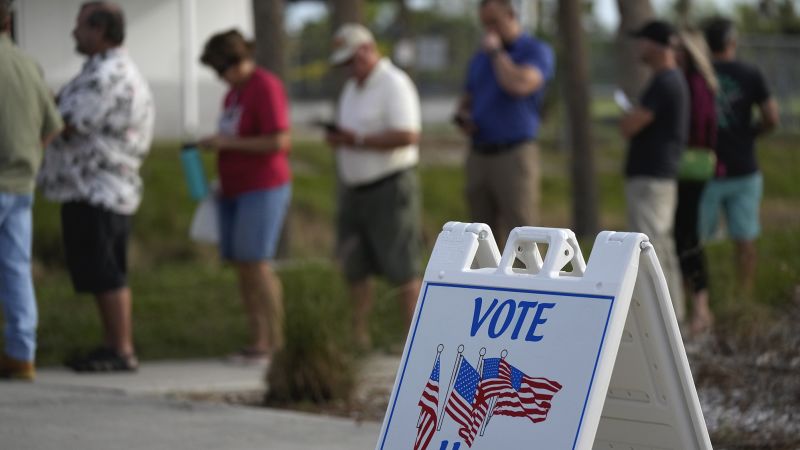
A version of this story first appeared in CNN Business’ Before the Bell newsletter. Not a subscriber? You can sign up right here. You can listen to an audio version of the newsletter by clicking the same link.
The results of Tuesday’s midterm elections will set the agenda for the next Congress. That could mean changes to fiscal policy, which uses taxes and government spending to influence a country’s economy.
But when it comes to the stock market, this election ranks fairly low on the list of things investors should worry about. The economic outlook and corporate profits will ultimately impact portfolios more than seats in Congress.
What’s happening: Markets tend to like divided government that will likely lead to gridlock. That’s because splitting power in Congress or between Congress and the executive branch reduces the likelihood of sweeping legislation that could present uncertainty for businesses.
But stocks have a bigger problem than who takes the House or Senate: The possibility of a recession ahead. And how deep and prolonged that may be will determine the trajectory of markets.
“Inflation, monetary policy, recession risk, and geopolitics have been far more important drivers of equity market moves than the potential for modest changes in US fiscal policy,” wrote Goldman Sachs analysts in a note. Politics have taken a less central role in recent discussions with investors than they have in past election cycles, they added.
High levels of federal debt, inflation and rising interest rates will likely outweigh the economic impact of any potential fiscal stimulus that Congress could enact, they added.
It’s all about the Fed: Inflation remains near 40-year highs, and part of the Federal Reserve’s mandate is to keep price increases in check. It’s monetary policy, which encompasses the management of interest rates, that will matter the most to the market.
“Ultimate political power may remain in the hands of voters, but for the next few years the course of the economy is almost entirely in the hands of the Fed and its blunt tools to tame inflation and support employment,” wrote Christopher Smart of the Barings Investment Institute in a note.
The bottom line: When it comes to the next big market catalyst, investors should look to the Fed, not Congress.
And what the Fed does next will likely be determined by the economic data released between now and December, when the central bank holds its next policy meeting. Next up is Thursday’s Consumer Price Index report, an important inflation gauge.
As for the midterms, investors may just be happy when the results are final. The market hates uncertainty.
“We expect the impact of the election to tilt the market positive, partly because we’ll have it behind us,” wrote Barry Gilbert and Jeffrey Buchbinder at LPL Financial. But “the policy impact is likely to be small, and market participants will continue to be more focused on central bank policy and inflation.”
Crypto chaos continues
Shockwaves rippled through the world of crypto on Tuesday when one of the largest exchanges for digital currencies, in the midst of a liquidity crisis that rattled digital assets and sparked contagion fears, was bailed out by a rival exchange.
Binance, the world’s largest cryptocurrency exchange, said it is buying its smaller rival FTX, after the exchange struggled to respond to a liquidity run spurred by the falling price of Bitcoin and other currencies.
The announcement stunned crypto investors, as a tie-up between the two largest crypto exchanges by volume would mark a tectonic power shift in the industry, reports my colleague Allison Morrow.
“I’m actually shocked by this,” an industry executive told CNN Business. “FTX failing … would be kind of like a Lehman Brothers event for the space. But if they have been successfully bailed out, then that would probably head things off at the pass.”
Binance and FTX didn’t immediately provide details about the deal, and noted the two sides were figuring it out in real time.
The news prompted a brief recovery in digital assets but wasn’t enough to calm anxious investors.
Bitcoin tumbled more than 10% Tuesday to hit a 52-week low around $17,600, according to CoinDesk. FTX’s in-house coin FTT cratered, losing 85% of its value. Other digital assets and equities tied to the industry, such as Coinbase, also fell.
EU opens deeper probe of Microsoft deal
The European Union is taking a closer look at Microsoft’s proposed $68.7 billion purchase of video game giant Activision Blizzard, citing concerns the deal could hurt competition in the video game industry, reports my colleague Brian Fung.
A preliminary review of the deal found that Microsoft (MSFT) could try to withhold the games it’s acquiring from other distributors, according to an EU press release. The proposed acquisition would see Microsoft become the world’s third-largest video game publisher, controlling popular franchises such as “Call of Duty” and “World of Warcraft.”
“Such foreclosure strategies could reduce competition in the markets for the distribution of console and PC video games, leading to higher prices, lower quality and less innovation for console game distributors, which may in turn be passed on to consumers,” the EU said.
The deeper-level probe, which could run through March of next year, is also driven by fears the acquisition could consolidate power in Microsoft’s Windows operating system at the expense of competition, if Microsoft attempts to make its PC games exclusive to Windows.
Techyrack Website stock market day trading and youtube monetization and adsense Approval
Adsense Arbitrage website traffic Get Adsense Approval Google Adsense Earnings Traffic Arbitrage YouTube Monetization YouTube Monetization, Watchtime and Subscribers Ready Monetized Autoblog
from Stock Market News – My Blog https://ift.tt/sy70BtU
via IFTTT

No comments:
Post a Comment